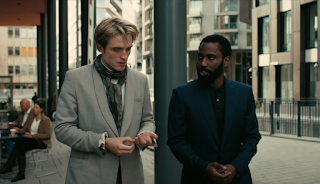On the evidence of this, Clooney as director should stick to his strengths, which so clearly lie in political and/or historical drama, and leave half-conceived melanges of social comment and sci-fi well alone. He may only have starred in
Tomorrowland,
but has managed to create an even bigger mess than that film was.
In a nutshell, it's 2049, Clooney is a dying scientist, choosing to remain alone at an Arctic base while the rest of the inhabitants leave to a world which has just been struck by an unspecified extinction-level catastrophe, and setting out to warn a space exploration ship on its way back to Earth to stay away for their own good. He finds a mute young girl who has seemingly been left behind during the evacuation and takes her under his wing, while starting to increasingly resemble a mad Santa. In the meanwhile, the story keeps hopping back to the returning spaceship, which is a strictly identikit number from any number of better films, and its crew go through the usual technical dramas without adding anything of dramatic interest, but a lot of sub-Gravity padding.
If, from a structural angle, it's easy to get annoyed with the uneven switches of tone in the story - a musical singalong amongst the crew leading immediately to a horrible disaster - and flabby pacing, what is actually its biggest failing is its utter disregard for scientific content. The disaster about to snuff out all remaining life on Earth is never explained in the slightest (at one point, just when you think they might give it a stab, radio static between Clooney and the ship conveniently does away with that) and in an era where even space operas have to make some effort at hard sci-fi plausibility, we get an idyllic faraway planet with no exposition of where it is or how to get there, regular asteroid storms and 'uncharted space' within the solar system.
The intention is clearly to issue a warning about what we're doing to our planet (thanks, George), but the level of infantility on show here with regard to the actual boring details ends up doing the eco-cause a huge disservice. For Christ's sake, get someone to sit Clooney down for a long hard talk before he thinks of doing anything like this again.
4/10






















